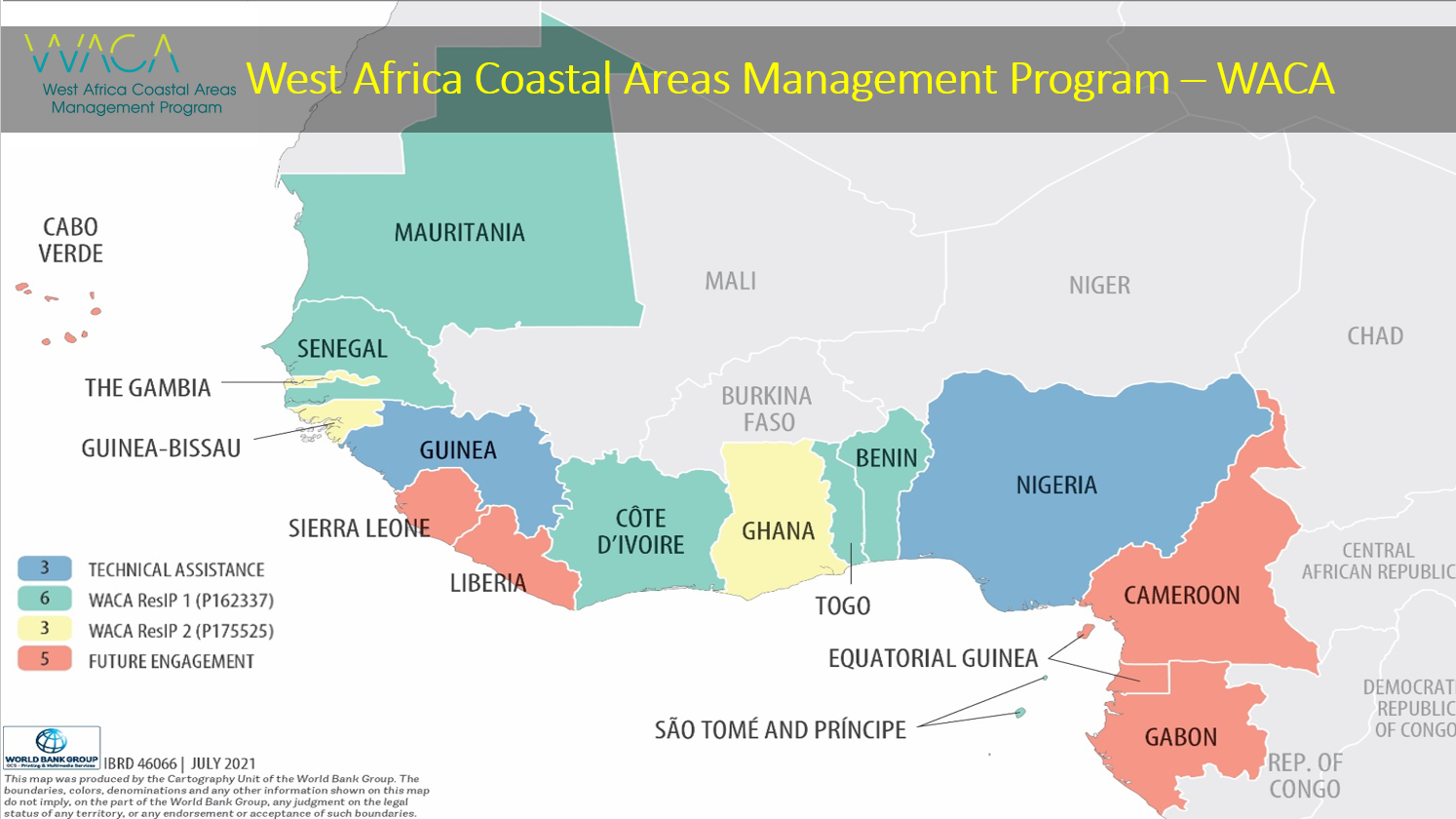Blog |
The Gambia, Ghana, and Guinea-Bissau join WACA
The World Bank approved $246 million for WACA Resilience Investment Project 2.
On December 15, 2022, the World Bank approved $246 million in financing for the WACA Resilience Investment Project 2 (WACA ResIP 2) that will benefit The Gambia, Ghana, Guinea-Bissau, and the WAEMU to manage coastal erosion, flooding and pollution. The project, financed by the International Development Association (IDA), includes a $5m recipient-executed PROBLUE grant for Ghana that supports a pilot mangrove blue carbon deal financed by the Danish energy company Ørsted, marine spatial planning, and marine plastics pollution management.
WACA’s investments in coastal resilience now cover nine countries in West Africa (see map) and support seven regional institutions on policy harmonization and cross-border solutions for coastal management, totaling a $507 million portfolio managed by the World Bank. Many partners provide financing and technical support to WACA, including the Nordic Development Fund (NDF), the French Agency for Development (AFD), the Global Environment Facility (GEF), and others, all of which contribute to the success of the program seen today. The WACA Program looks forward to continuing its collaborative efforts in 2023 to expand direct support to communities facing immediate risk from coastal erosion, flooding, pollution, aggravated by climate change.
What will the new project do?
The project will build physical coastal infrastructure and nature-based solutions to protect communities and livelihoods from coastal erosion and flooding. It will also support social projects to protect and expand livelihood opportunities for coastal communities.
In Ghana, where coastal areas are densely populated and communities rely on ecosystem services, ambitions are high:
“The government of Ghana embraces a landscape approach to managing coastal areas. Our strategy for mangroves seeks to better capture the carbon sink opportunity. Under ResIP 2, I believe that IDA, PROBLUE and Ørsted-financed pilot program for blue carbon will accelerate the scale up to a landscape approach and better protect our coastal assets,” said H.E. Kweku Afriyie, Minister for Environment, Science, Technology and Innovation, Ghana.
The three-country project have the same design as the first WACA resilience investment projects: strengthen coastal policy and building capacity of national institutions; and enhance coastal and climate resilience through specific physical investments for coastal erosion and flood control, pollution, and sustainable ecosystem management. In addition, social subprojects will be financed to support livelihoods and income generating activities.
What are the key national investments?
- In The Gambia: reducing the impact of flooding through the restoration of Kotu stream, including a green river park in the area at the mouth of the stream. This includes nature-based solutions to reduce risk and sequester carbon; floods mitigation; replacement and rehabilitation of bridges, culverts and drainage systems; and community solid waste management and sanitation projects. The project also includes sand and market-based approaches to create sustainable jobs for women, starting with a jobs-market assessment and identification of key jobs effects.
- In Ghana: reducing flooding in Greater Accra through the construction of a jetty at Korle Lagoon; improving ecosystem health and protecting communities from erosion in the Volta Delta and Keta Lagoon through the protection and restoration of mangrove forests; nourishment of sandy barriers; dune re-vegetation; and building of protective infrastructure such as groynes. Investments will also address improved flood management along the Weija River, oil spill preparedness, and marine plastics management. Social subprojects focus on livelihood protection and restoration.
- In Guinea-Bissau: improving access and infrastructure through small to medium scale works in the Bijagos, including the Bubaque jetties for coastal protection, mangrove ecosystem restoration for flood management, mangrove and seagrass conservation, and reducing deforestation by providing solar energy systems to replace wood as an energy source. Social subprojects include community infrastructure such as wells and schools.
National projects, harmonized with a regional integration component, will be led by the West African Economic and Monetary Union (WAEMU) and the Regional Implementation Support Unit hosted by the International Union for Conservation of Nature (IUCN) in Dakar, Senegal. With countries from the Economic Community of West African States (ECOWAS) now included, WACA ResIP 2 formalizes a special coordination mechanism - ECOWAS and ECCAS have been part of the WACA Regional Steering Committee since 2018.
What are regional integration activities?
- Support to the West Africa Coastal Observatory, hosted by the Centre de Suivi Ecologique (CSE) in Dakar. This observatory periodically issues the State of the Coast Report, scientifically reviewed by regional experts and politically validated by countries in a process facilitated by WAEMU.
- Collaboration with the Abidjan Convention which supports regional coastal and environmental policy harmonization across countries, including through the inclusion of Abidjan Protocols into national laws.
- Engagement with private sector building on the partnership with the Ports Management Association for West and Central Africa (PMAWCA) to develop a set of performance standards for sustainable ports, and the foundations needed for the necessary investments within the tourism industry.
- Expanded support to the Africa Center of Excellence for Coastal Resilience (ACECoR) at the University of Cape Coast, Ghana to improve regional research capabilities, build state-of-the-art research and learning facility, and pursue joint research initiatives on nature-based solutions and integrated sediment management.
Using the multilateral Bank approach, the project’s climate co-benefits are estimated at 75% and are expected to drive in a reduction in net Greenhouse Gas emissions due to carbon sequestration activities. The total carbon emissions saved by the project are expected to reach 2,555,319 tons of carbon dioxide equivalent (CO2e), or the equivalent of 85,177tCO2e savings per year.
The project has been Gender Tagged, aligned with the World Bank Gender Strategy (2016-2023), thanks to activities supporting increased women’s participation in mangrove resource management, and removing constraints for more and better jobs for women in solid waste management, tree planting, and urban farming.
Press Release
